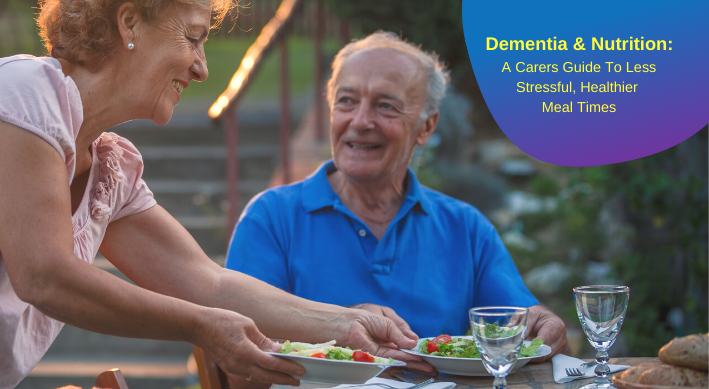You’re caring for someone with dementia. You know nutrition matters but your loved one isn’t easy to feed. At least 3 times a day, you’re facing the stress of yet another difficult mealtime.
How does dementia make mealtimes difficult?
Due to their dementia, the person you’re caring for may:
- Forget to eat
- Think they’ve already eaten
- Feel overwhelmed by too many food choices
- No longer recognise what’s on their plate
- Have a weakened sense of taste or smell
- Lose their appetite.
How can you create more enjoyable mealtimes?
The trick to creating less stressful, more enjoyable mealtimes is to reduce confusion by simplifying the experience as much as possible.
You can do that by:
- Keeping the focus on the meal by sitting in a quiet place with the TV turned off
- Avoiding patterned plates or tablecloths
- Using white plates or bowls so the food is easier to see
- Using plain but different colours for the mats or tablecloths
- Proving only the utensils needed to eat with (remove everything unnecessary from the table)
- Try to stay relaxed about sudden changes in food likes and dislikes
- Check the food is not too hot or cold
- Allow plenty of time for mealtime
- Eat in company – seeing others eat may encourage your loved one to eat
- Accept their memory loss – if they’re distressed because they think they haven’t had breakfast, then serve them a small bowl of cereal or a glass of juice.
Do yourself a favour too. Make cleanup easier by purchasing tablecloths that you can wipe down.
How can you improve nutrition in someone with dementia?
Easier mealtimes are only one part of your concern, though. You really want to make sure your loved one is receiving proper nourishment. How do you get more high-quality calories in?
You can try:
- Serving only one or two food items at a time so there’s no difficult choice about where to start
- Providing a variety of healthy foods, including fruits, vegetables, whole grains, lean protein and low-fat dairy options
- Limiting saturated fats like butter, lard and fatty meat
- Reducing high-calorie, low-nutrition food like refined sugars
- Adding flavour by using herbs and spices rather than salt
- Improving hydration by offering small cups of water regularly or serving foods like fruit, soup, milkshakes or smoothies.
A few final tips
What else can you do?
Take your loved one to the dentist regularly to ensure they’re not avoiding food due to toothache or ill-fitting dentures. Dementia can make someone more susceptible to dental problems.
And maybe encourage more exercise such as going for a walk or doing a bit of gardening in order to burn some calories and build up an appetite.
How can Focused Health Care help?
Caring for someone with dementia is a marathon, not a sprint. You don’t have to do it all by yourself. In-home care may help to share the responsibility, ensuring you have the stamina you need to keep going.
Focused Health Care provides friendly, patient, trained carers who can help at mealtimes. Contact us today about in-home care for your loved one with dementia.
Disclaimer
All information is general in nature. Patients should consider their own personal circumstances and seek a second opinion.






